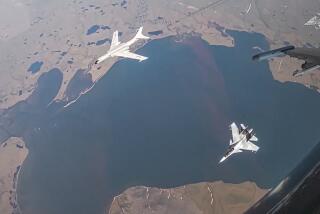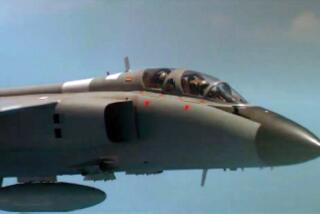White House Downplays China’s Military Use of Satellites
- Share via
WASHINGTON — The White House sought Saturday to shrug off the disclosure that China’s military has been using American-made communications satellites to transmit messages among its army units, contending that the practice has provided no real military value to the Chinese.
In Portland, Ore., where President Clinton delivered a commencement speech before traveling to Los Angeles, White House spokesman Joe Lockhart told reporters that “militaries around the world use commercial satellites,” and “we do not believe it provides any particular military benefit.”
Despite the White House response, the new report seemed likely to fuel the growing controversy over administration policies that have allowed launching of U.S. satellites in China--particularly a 1996 incident critics say provided sensitive technology to China.
Henry D. Sokolski, director of the conservative Nonproliferation Policy Education Center in Washington, said Saturday the disclosure appeared certain to “cause a flutter” in the Republican-controlled Congress, which is investigating the administration’s policies toward technological exports to China.
Sen. Richard C. Shelby (R-Ala.), chairman of the Senate Intelligence Committee, said in a radio address Saturday that Clinton’s policies concerning satellites represented a “fundamental sea change” in U.S. strategy, but his remarks--taped Friday--did not mention the new reports. He was not available for comment Saturday.
The New York Times reported Saturday that Chinese army units have been relying on U.S.-made civilian-use satellites to communicate among each other--a revelation that it attributed to highly classified intelligence reports.
But administration officials essentially brushed off the article, saying U.S. authorities had been well aware of the practice for months and indicating that American intelligence agencies have been monitoring the Chinese communications.
Satellite experts say the National Security Agency works closely with U.S. satellite makers to make sure the government retains the technical capability to monitor their performance. Officials said Saturday that that gave U.S. agencies a better chance of intercepting Chinese army messages.
U.S. officials also said that a report by Chinese officials after a Chinese rocket carrying a satellite exploded in 1996--and reviewed by American satellite makers--had provided important data to U.S. agencies about the workings of China’s Long March missiles.
That disclosure was designed to counter allegations by critics that the 1996 exchange between Chinese and U.S. rocket experts had given sensitive information to China. American firms discussed the Chinese data with U.S. officials but did not show them a reply they sent China.
One reason that the disclosure of the Chinese military’s use of U.S.-made satellites was considered likely to cause a stir was that until now, the Clinton administration has been insisting that allowing the satellite-makers to go to China to launch their vehicles provided no military advantage for the Chinese.
John Piotrowski, a retired Air Force general who headed the North American Air Defense Command, said that while the satellites doubtless improved the ability of Chinese military units to communicate, the revelation that they were doing so should not be a surprise.
“I think that anybody who sold a communications satellite to the Chinese would be naive to think that the Chinese government would not be using it to communicate military information,” he said.
The New York Times report said the Chinese military used American-made commercial satellites that were sold to Hong Kong companies with ties to the Chinese government in the early 1990s.
The 1996 incident, in which a Chinese Long March missile blew up while launching an American-made communications satellite, has drawn criticism from lawmakers on two grounds:
When investigators cleared away the debris, they found that a sensitive encryption chip designed to prevent outsiders from changing the position of the satellite in space was missing, raising the possibility that the Chinese may have taken it.
And, two American satellite companies--Loral Space & Communications and Hughes Electronics--that had been asked by China to review a report it compiled on the explosion failed to clear their responses with the State Department before sending them to the Chinese, as required by law.
There was no immediate indication whether either factor resulted in the leak of sensitive technology.
Times Washington Bureau Chief Doyle McManus contributed to this story from Portland, Ore.
More to Read
Sign up for Essential California
The most important California stories and recommendations in your inbox every morning.
You may occasionally receive promotional content from the Los Angeles Times.













